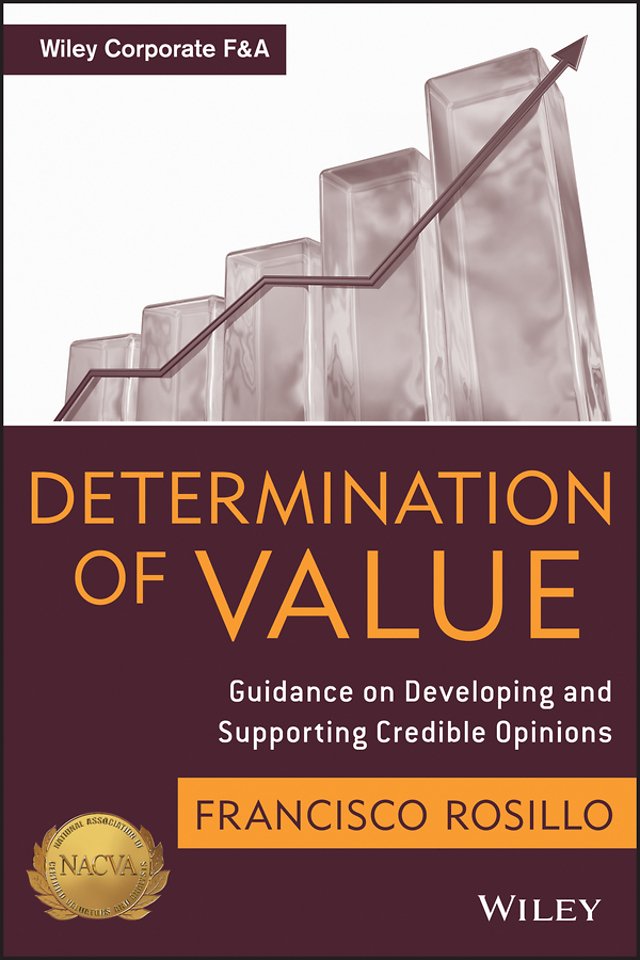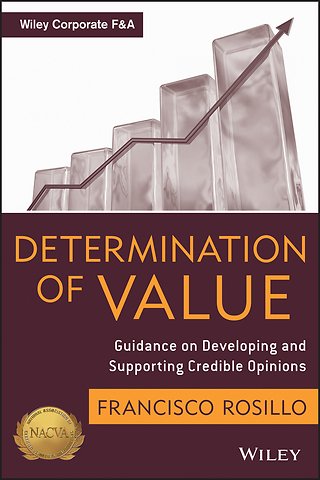Determination of Value – Appraisal Guidance on Developing and Supporting a Credible Opinion
Appraisal Guidance on Developing and Supporting a Credible Opinion
Gebonden Engels 2013 9781118287897Samenvatting
How to develop and support a credible opinion of value based on a foundational framework
This book provides knowledge and guidance to valuation practitioners on achieving a new level of professionalism and credibility, as well as to those stakeholders in the valuation process in need of assessing the credibility of an appraiser′s work product for decision–making purposes. It introduces a well defined framework of key credibility concepts and procedures at each step of the appraisal process, including reasonableness tests, valuation methodologies, financial analysis, economic and industry analysis, engagement planning, and informed judgment.
Provides needed guidance to valuation practitioners to enhance their valuation practice and improve the credibility of the appraiser′s work product
Offers guidance to stakeholders in the valuation process in need of assessing the credibility of an appraiser′s work product for decision–making purposes
Get foundational framework appraisal advice with the proven guidance found in Determination of Value.
Specificaties
Lezersrecensies
Inhoudsopgave
<p>Acknowledgments xiii</p>
<p>Chapter 1: The Problem 1</p>
<p>In Search of a Truth 1</p>
<p>The Assurance Expert 4</p>
<p>Credibility Is Not Synonymous with Truth 7</p>
<p>Where Do We Go from Here? 8</p>
<p>Chapter 2: The Solution 9</p>
<p>Toward a Defi nition of Credibility 9</p>
<p>The Attributes That Make You Credible 10</p>
<p>Operational Credibility Attributes 11</p>
<p>Personal Credibility Attributes 19</p>
<p>General Observations about Credibility 21</p>
<p>Credibility Is Not Synonymous with Truth 23</p>
<p>Don t Confuse Opining with Decision Making 25</p>
<p>Beware of Black Box Opinions 26</p>
<p>Conclusion 26</p>
<p>Chapter 3: The Credibility Pyramid and the Importance of a Well–Defined Analytical Process 29</p>
<p>The Importance of Process 29</p>
<p>The Valuation Process 31</p>
<p>The Credibility Pyramid 34</p>
<p>Three Problem–Solving Phases 36</p>
<p>Conclusion 41</p>
<p>Chapter 4: Pyramids, Not Castles 43</p>
<p>Why Is Credibility Important? 44</p>
<p>Reasonable Assurance 47</p>
<p>Generally Accepted Practices 50</p>
<p>Generally Accepted Practices Lead to Uniformity and Professional Consensus 54</p>
<p>Analytical Gaps 55</p>
<p>Informed Judgment 56</p>
<p>Conclusion 59</p>
<p>Chapter 5: Climbing the Credibility Pyramid 61</p>
<p>The Importance of Revenue Ruling 59 60 61</p>
<p>Identification of Key Pre–Engagement Parameters 63</p>
<p>Planning to Acquire Knowledge about the Subject 65</p>
<p>General Planning Considerations 69</p>
<p>The Importance of the Standard of Value as You Climb the Pyramid 79</p>
<p>Self–Assessment Tools 83</p>
<p>Stepped Reading 87</p>
<p>Conclusion 88</p>
<p>Chapter 6: How to Develop and Report Your Opinion 91</p>
<p>Practice Presenting Your Written Findings Orally 91</p>
<p>Valuation Adjustments 102</p>
<p>Description of a Benchmarking Methodology Used by Valuation Analysts 106</p>
<p>Benchmarking: Relative Weights and Qualitative Analysis 111</p>
<p>Make Sure There Are No Analytical Gaps in the Development and Derivation of Growth Rates 115</p>
<p>Incorporating Prospective Information That Is Presented into Your Opined Results 119</p>
<p>Reporting Your Opined Results 126</p>
<p>Conclusion 129</p>
<p>Chapter 7: Reasonableness Tests 131</p>
<p>Determining Reasonableness 132</p>
<p>Example 1: Derived Estimate of Value 136</p>
<p>Example 2: Guideline Company Method 139</p>
<p>Example 3: Use of Market Multiples 144</p>
<p>Example 4: Federal Tax Compliance 145</p>
<p>Conclusion 146</p>
<p>Chapter 8: Enhancing the Integrity of Your Opinion 149</p>
<p>Understanding the Credibility Threshold 150</p>
<p>Understanding the Scope Undertaken 152</p>
<p>Understanding Analytical Responsibilities and the Impact of Matter/Cause/Effect Analysis 154</p>
<p>Conduct Your Analysis within the Parameters of the Economic Reality Relevant to the Facts and Circumstances 156</p>
<p>Maintain a High Level of Professional Skepticism and Engagement Awareness 157</p>
<p>Review Your Analytical Process for Relevance and Typical Common Errors 160</p>
<p>Be Ready to Respond to Ethical Challenges 162</p>
<p>Enhancing the Integrity of Your Opinion When at Trial or in Hearings 163</p>
<p>Enhancing the Integrity of Your Opinion When at Deposition 166</p>
<p>Conclusion 166</p>
<p>Chapter 9: Reviewing the Work of Others 169</p>
<p>Review Engagement Procedures to Consider 170</p>
<p>Preparing a Document Request for a Review Engagement 172</p>
<p>The Role to Be Assumed: Reviewing Expert or Reviewing Consultant 173</p>
<p>Limiting Conditions and Assumptions 174</p>
<p>Determining an Appropriate Scope for Your Review 175</p>
<p>Minimum Scope Considerations in a Review Engagement 177</p>
<p>Conclusion of a Business Appraisal Review Engagement 177</p>
<p>Business Appraisal Review Opinion 178</p>
<p>Reviewer s Independence 182</p>
<p>Common Errors and Analytical Gaps Found in Valuation Reports 183</p>
<p>Conclusion 188</p>
<p>Chapter 10: The Journey Continues 189</p>
<p>Definition of Credibility 189</p>
<p>Attributes Attached to a Credible Opinion 190</p>
<p>Separating Decision Making from Opining 192</p>
<p>A Note on Generally Accepted Principles and Practices 193</p>
<p>A Definition of the Concept of Informed Judgment 193</p>
<p>Suggestions for Assessing Your Own Methodology the Importance of Reasonableness Tests 194</p>
<p>Suggestions for Enhancing the Integrity of Your Opinion 194</p>
<p>Conclusion 195</p>
<p>Appendix 197</p>
<p>About the Author 209</p>
<p>Index 211</p>
Anderen die dit kochten, kochten ook
Rubrieken
- advisering
- algemeen management
- coaching en trainen
- communicatie en media
- economie
- financieel management
- inkoop en logistiek
- internet en social media
- it-management / ict
- juridisch
- leiderschap
- marketing
- mens en maatschappij
- non-profit
- ondernemen
- organisatiekunde
- personal finance
- personeelsmanagement
- persoonlijke effectiviteit
- projectmanagement
- psychologie
- reclame en verkoop
- strategisch management
- verandermanagement
- werk en loopbaan







